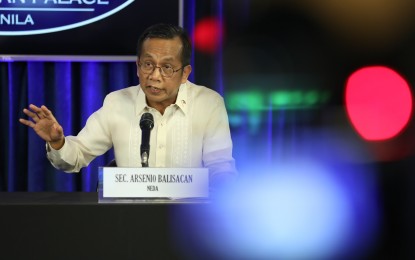
RCEP RATIFICATION. National Economic and Development Authority (NEDA) Secretary Arsenio Balisacan holds a press briefing in Malacañang Palace on Tuesday (Feb. 21, 2023). Balisacan maintained that the Regional Comprehensive Economic Partnership (RCEP) must be ratified by the Senate as it would ensure the protection of the agriculture industry as well as increase investments and employment opportunities in the country. (Photo by Rey S. Baniquet)
MANILA – The national government will be “forced” to play closer attention to the country’s agriculture sector should the Regional Comprehensive Economic Partnership (RCEP) trade deal be ratified, National Economic and Development Authority (NEDA) Secretary Arsenio Balisacan said Tuesday.
In a Palace press briefing, Balisacan pushed anew for the ratification of the RCEP agreement in the Senate and shut down concerns that it would affect the Philippine agriculture sector.
“With regards to the allegation that the agricultural sector could be hurt, there’s no truth to that because whether or not there is RCEP we need to invest in agriculture, kinakailangan natin ma-address yung mga (we need to address these) concerns,” he said.
Balisacan maintained that the problems hounding the agriculture industry have “nothing to do with RCEP.”
“The problems were outcome of past neglect of the sector. Di natin inalagaan yung (We neglected the) sector for so many decades. So very low productivity of agriculture has nothing to do with the RCEP,” he said.
“In fact, my view is that by adopting RCEP, ratifying RCEP, we will be even more forced to pay attention to agriculture because only then can you fully maximize the benefits that RCEP can give to us,” he added.
He also pointed out that the RCEP ensures the protection of the agriculture industry by providing opportunities to farmers.
“Gagawin naman natin ang pagpo-protect sa (We will protect) agriculture, with or without RCEP. I think for us it’s a game changer kaya ang (that’s why in the) NEDA we are pushing for this hard kasi (because) it’s so crucial in our effort to get our economy in becoming an important part of this dynamic region in this part of the world,” he said.
More investments, jobs
Moreover, Balisacan said the ratification of the RCEP will increase investments and employment opportunities in the country.
“By being member, we are saying to the world that we are ready for business, you are welcome here, we play the rules of the game well, and your investment is safe with us,” he said.
He said failure to ratify the RCEP would mean limiting the country’s opportunity to lure investments.
“It must be ratified. The future of our country depends so much in our ability to attract investors, particularly foreign capital because the domestic capital is not enough,” he added.
Balisacan explained that neighboring countries are “aggressively” looking for investors, so it is time for the Philippines to shape up.
“If we don’t shape up, keep our investment climate, keep our rules of the game clearer so that they are attracted to come in, then they will simply go to these other countries and we’ll be left out. As an economist, without those massive investments, you can’t expect to generate high quality jobs. We need a lot of investment. There’s only so much that you can generate internally,” he said.
He said the country has incurred so much debt during the pandemic leading to limited fiscal space.
“The only way we can growth and maintain our growth at the rate we have experienced last year is to get investment players that can build infrastructure for us so that jobs can be created,” he added.
The RCEP is a free trade agreement between the 10 member states of the Association of Southeast Asian Nations or ASEAN and its five FTA partners namely Australia, China, Japan, New Zealand and South Korea. ASEAN members are Brunei, Cambodia, Indonesia, Laos, Malaysia, Myanmar, Singapore, Philippines, Thailand and Vietnam.
It was signed by the Philippines in November 2020.
The RCEP entered into force for other signatory countries on Jan. 1, 2022 but remains unimplemented without the ratification of the Senate.
The Philippines is the only nation in Southeast Asia that has yet to ratify the RCEP. (PNA)
